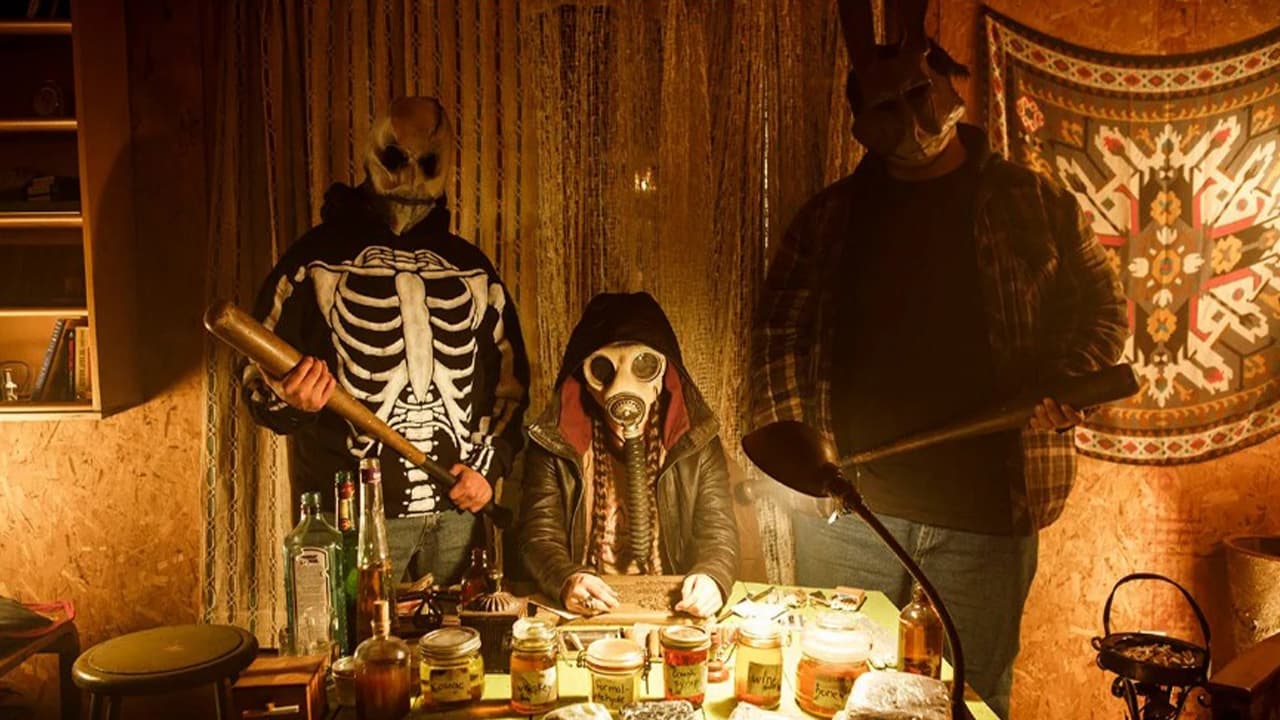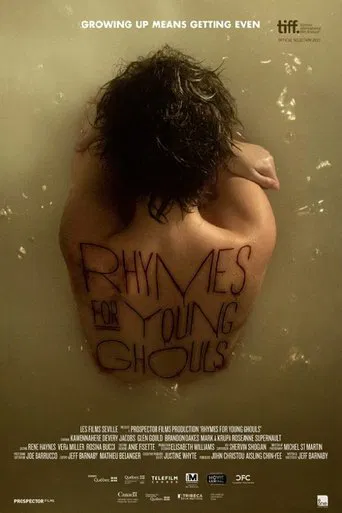

Director/write Jeff Barnaby just kills it in his first feature length movie. Set on a Canadian reservation in the 70s the film follows Aila (Devery Jacobs who is astonishing). After a tragic accident involving her little brother Aila is left essentially parentless. By the time she's 15 she's dealing drugs, though she wears as gas mask to ensure she doesn't get high while she deals. The weed also serves another purpose; to keep from being carted off to a residential school run by priests where abuse is high, Aila pays a fee so that the white cops will ignore her presence. The movie follows many twists and turns but eventually turns into a heist film. But what a great one it is! The performances are all great but Devery Jacobs turns out to be the real find of the movie. She is astonishing as Aila, a small kid who has been almost completely hardened after being left to fend for herself. The cinematography by Michel St. Martin is a stunner. Not to spoil anything but there is a fight scene on the beach that is equal parts beauty and gore. Do yourself a favour and watch this film.
... View MoreCharacters depicted as nothing but unstable, which is odd. I wanted to find the good in them too (compassion, simple etiquette, consciousness) but I haven't. They can be 'just a bunch of savages' to non-natives. The narrative fails to explain the cause of tthe drug-dealing, violence, prostitution, and constant profanity within the community. I already knew that those were the consequences among natives due to residential/day schooling, but I don't know if me not knowing that in the movie is explicable to my autism, which leads to my point of ableist language that is failed tto be addressed within the movie. (A male character says 'that is so f****** retarded. The female one exclaims 'you two are the dumbest Indian since bugs bunny puts on a headdress'-a combo of that and internalized racism. Girl, they're HIGH! I thought you would know that after years of selling weed! I haven't even touched weed and I know that weed causes extreme fatigue over time! Dafuq!)These people don't even have the common decency to withhold profanity in front of kids! Heck! They even drunk drive with the kids! Why wouldn't they let the kids spend the night somewhere? They're not smart enough to? And what is with the overuse of the F word? They rot my brain by just cussing too much. I know everyone isn't perfect, but all of them are the crack of the barrel! And they had to be extra by throwing that random Wendigo tale in just to make me even more disgusted with the movie!I'm African American. I lived in the 'ghettos', but the last thing I want is us to be depicted as nothing and nothing but extreme (unwise) caricatures (like this movie does to Amerindians). I'm not a child but there are too many G/PG movies that address native American issues in an apparently Eurocentric or colonist mindset. The movie could have been the exception that is appropriate for EVERYONE at ANY AGE to understand. But no; I guess there is a very foolish saying 'you can't explain your reality to a child.' Says who!
... View MoreA good film where Mi'kmaq is spoken in it. However this delves into the horrors and abuses Native kids were forced to endure at the residential schools (aka death camps). This film depicted a more radical form of the abuse those poor kids had to go through. I guess it seemed more radical to me since the music that accompanied the film made it appear that way. But nonetheless this one showed the abuses the kids went through similar to some other Native films depict.The scene at the beach where Glen Gould's character and her daughter were kidnapped and taken hostage by the residential school staff, the Indian Agent and RCMP: although it was a film, I was still disgusted at how they all took turns in beating him and his daughter up like that! The daughter was not under 18 so she should not have been sent away to the damn school. As for her father, it was insane how they took him, tied him up to a chair and beat him mercilessly literally for nothing! At the beach they told him he "wasn't supposed to go out onto the water". I don't know WHY he wasn't supposed to do that but they "charged" him for doing that.Anyways... I give this film an 8 out of 10.
... View MoreMovies that receive lasting attention tend to fall into two, non-mutually exclusive categories: Important Movies, which are significant but not necessarily good, and Great Movies, which are good but not necessarily significant. Rhymes for Young Ghouls is undoubtedly an Important Movie, but it is certainly not a Great Movie. Rhymes for Young Ghouls is Mi'kmaq director Jeff Barnaby's first feature and, despite the honest praise it has generated through festival engagements and local word-of-mouth, it shows. Although the typical plot synopsis makes the film's narrative seem relatively undaunting—simplistic, even—Barnaby's screenplay is far from a straightforward affair. Aila (Davery Jacobs) lives on the Red Crow reserve in the constant shadow of the residential school system, represented by a tyrannical, corrupt, and paedophilic Indian Affairs agent named Popper (an ethnically-ambiguous Mark Antony Krupa). Her mother (Roseanne Supernault) is dead, having committed suicide after accidentally running over Aila's baby brother during a drunken outing, and her father (Glen Gould) has spent most of her childhood away in prison, having taken the blame for the incident. Under the loose guidance of her shifty uncle Burner (Brandon Oakes), she runs a pot-dealing circuit, furnishing artisan-crafted joints for weekly Bacchanalian gatherings at her family's deserted compound, until her father's unexpected reappearance throws the entire operation into jeopardy and drags Popper violently back into the picture. That much of a setup would have been simple enough to support the film's central revenge plot against Popper and the residential school system. Rhymes for Young Ghouls, however, does itself the unfortunate disservice of extending its plot and characters too far for its 88-minute runtime to contain. The entire film plays like a garbled, heavily-condensed version of much longer and presumably more fleshed-out screenplay. Barnaby's script throws around too many inadequately-drawn characters and off-screen backstory in its opening minutes for the audience to reasonably follow (the thick rez accents affected by the main characters only aggravates the issue), making the remainder of the plot nigh on incomprehensible, even after a second viewing. Aila, for instance, has two stoner sidekicks, Sholo and Angus, whose personalities, relationships, and significance to the plot are sped through in one breakneck exchange of dialogue. There is also a grandmother figure, who inexplicably claims to not even be Aila's real grandmother and whose only ostensible purpose is to front Aila's grow-op and to slow down the narrative with a blatantly reflexive interlude of oral history. There is a big difference between ambiguity and incoherence, and this film veers decisively into the latter territory.Assuming that the narrative itself isn't also some kind of similarly-allegorical Thomas King-esque pastiche of oral history-—which I think would be giving Barnaby way too much credit—-the way that Rhymes for Young Ghouls plays out relies far too heavily on convenience and loose ends to work in the manner that a plot-driven picture like this requires. Popper, his henchmen, and the residential school for which they work as enforcers are initially painted as some kind of insurmountable menace on the Red Crow reserve, and yet both Aila and her kindergarten-aged protégé are apparently able to slip through their clutches and to walk right out of the residential school without any opposition whatsoever. Aila's father receives so many bludgeons to the face by the end of the film that it is a wonder he doesn't die of severe head trauma. I get the impression that Rhymes for Young Ghouls is desperately trying to tell me something or to make some kind of crucial point, but, even after two viewings, I still can't bother to trudge through the quagmire of its plot long enough to be able to engage with it at any deeper level. I'm all for a film that demands work from the audience to arrive at some semblance of meaning, but I draw the line at this one.This is not to say that the film offers nothing of value. To be fair, I'm almost willing to forgive Rhymes for Young Ghouls' narrative shortcomings on the sheer strength of its performances and its virtuosic visuals. Devery Jacobs, without exactly knocking it out the park and lacking the charisma to effectively carry the film, surely deserves the accolades she's received for the angsty reticence she brings to her role. Michel St. Martin, a thus-far undistinguished cinematographer, shot this film and infuses it with some truly unforgettable images; there is both tremendous beauty and unflinching horror in this film. The opening credits sequence, consisting of a slow-motion tracking shot of drunken Indians being savagely beaten by Popper's henchmen outside of a strip club while the Black Keys play on the soundtrack, teases the audience with the promise of a masterful slice of pure cinema that, sadly, the film's garbled plot fails to follow up on. Although it is impossible not to roll one's eyes at Jeff Barnaby's repeated comparisons of the film to the likes of Inglourious Basterds and A Clockwork Orange (one of the characters even throws out the word "horrorshow" at one point), it is not a stretch to wonder if, with a tighter narrative and richer characterization, Barnaby and company could have come close.Rhymes for Young Ghouls, while not a Great Film, will hopefully come to be widely recognized as an Important Film and open the floodgates for more mainstream projects by aboriginal artists. Although, as a tale of the unspeakable horrors of the residential school system in Canada, Rhymes for Young Ghouls pales in comparison to those of indigenous novelists like Thompson Highway, Richard Wagamese, Eden Robinson and Joseph Boyden, it is a clear step in the right direction that Barnaby's film has sparked further dialogue about Canada's dark past, both domestically and internationally. I may not be particularly sold on it, but, ideologically, I'm loath to wish failure upon it; if this is where First Nations cinema is going, I eagerly await to see where it finally ends up.
... View More